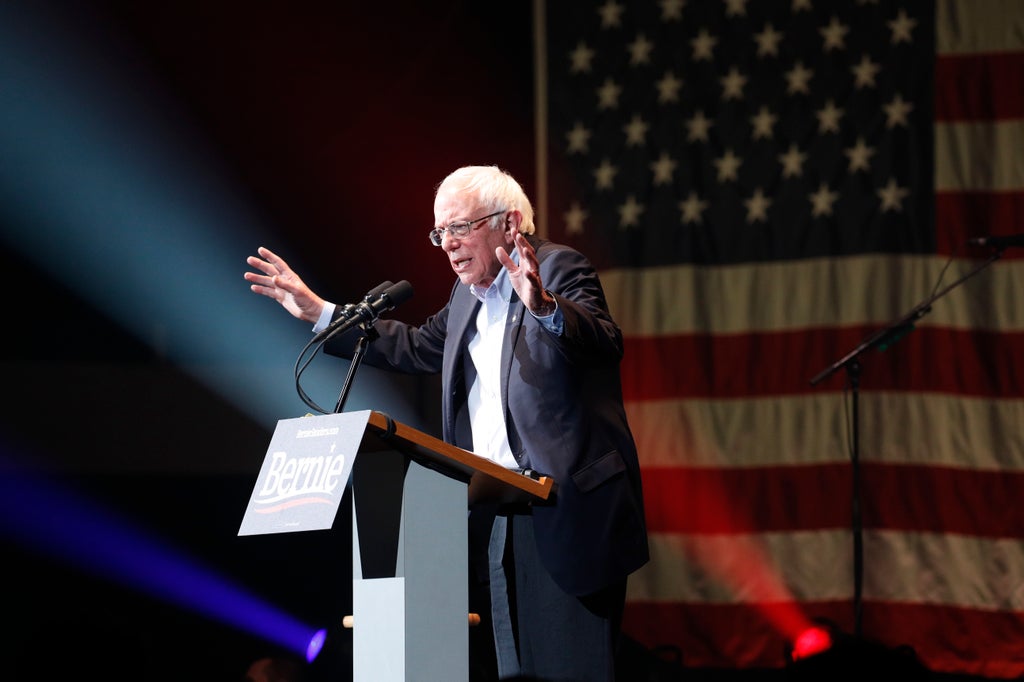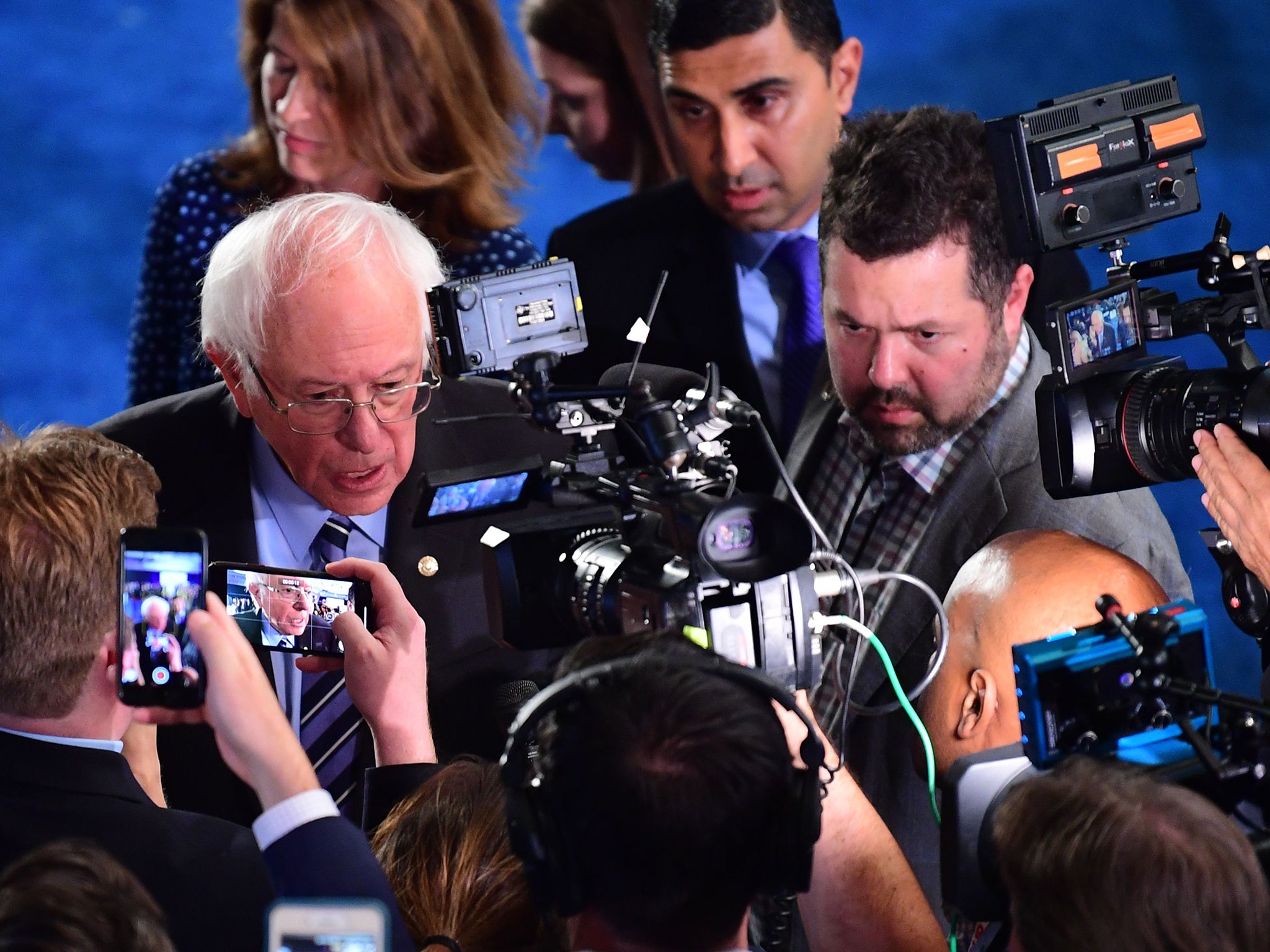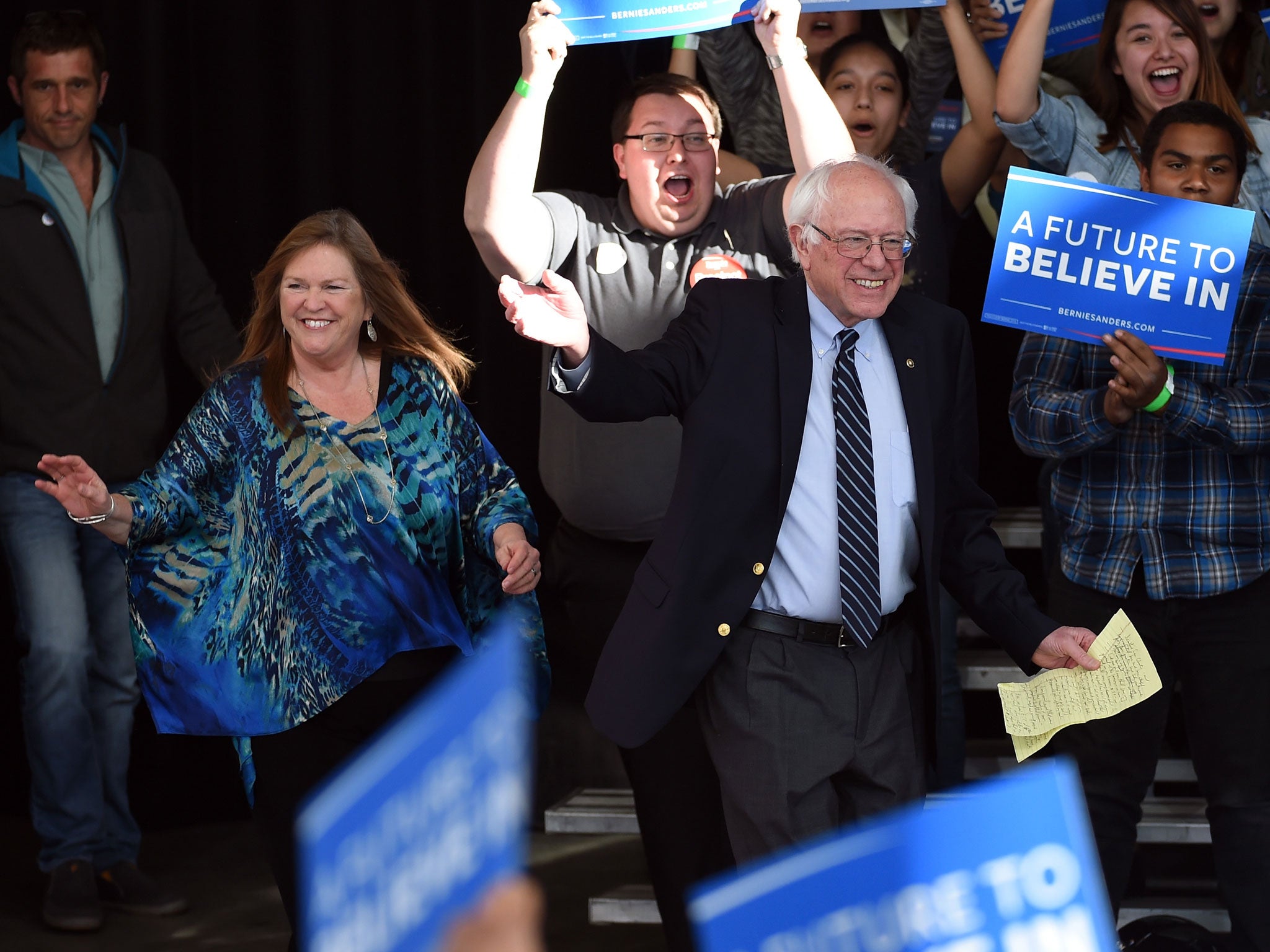
“How do we create the magic?” Sen Bernie Sanders frequently asked his future deputy campaign manager, Ari Rabin-Havt, whenever they discussed a potential play for the presidency back in 2018. The query was contemplated so often that the former Sanders aide now admits that it was initially considered for the title of his new book, The Fighting Soul: On the Road With Bernie Sanders. It was a salient question – one that ultimately required months of weekly phone calls with the 80-year-old beloved Vermont senator and what Mr Rabin-Havt refers to as a “rotating cast” of players to answer properly.
As he carefully chronicles in The Fighting Soul, Mr Sanders was hesitant, and justifiably so. After all, it would be his second bid in what would eventually become a 27-person primary in a race against one of the most collectively reviled presidents in American history. He wanted to feel certain he had what it took to defeat Donald Trump, and with a lot of time and reassurance from trusted aides like Mr Rabin-Havt, Jeff Weaver and his wife, Jane, he got there – even if he didn’t have complete faith in his own force.
“What he never fully accepted was that he was the magic,” Mr Rabin-Havt now fondly remembers in a Zoom with The Independent.
Many have tried to tell the story of who Sen Bernie Sanders is, but few have gotten it right – amounting only to mere speculation as to what kind of “magic” a buttoned-up, bullish career politician could possibly wield not only to endure decades of public service, but to have recently emerged as one of the most recognisable, revered lawmakers in the United States. Many of such attempts prompted Mr Rabin-Havt, who – while on the road – had unique and unfettered access to the senator, to write about his time on the trail.
“I saw a lot of reporters writing books about the campaign and I was worried somewhat – with how I felt our campaign was treated by the press at times – about the story that was going to be told. I wanted to make sure there was a contribution to the first draft of history of this election and of who Bernie Sanders was that really fit the person and told the story of who he was.”

While Mr Rabin-Havt is quick to acknowledge the media’s near-constant criticism of Mr Sanders, if there’s one thing The Fighting Soul refuses to indulge in, it’s playing the blame game. And if anyone was hoping for the kind of splashy campaign book fat with frivolous gossip and not much else, The Fighting Soul isn’t it –“I think palace intrigue is boring unless you own the palace,” Mr Rabin-Havt shrewdly notes.
Instead, he “sticks to the issues,” as his former boss instructed upon learning he was writing the book and provides ample evidence as to why – as New York Times columnist Maureen Dowd just pointed out – many are still “feeling the Bern” now more than ever.
Mr Rabin-Havt’s resume touts a history of working alongside foremost political personalities. He’s been an advisor to Senate Democratic Leader Harry Reid, John Kerry and former vice president Al Gore, among others. For five years, he was also host of The Agenda, a national SiriusXM radio show, where he covered the 2016 election and the first year of Mr Trump’s presidency. In addition to The Fighting Soul, Mr Rabin-Havt has authored three books: The Fox Effect: How Roger Ailes Turned a Network into a Propaganda Machine (2012), The Benghazi Hoax (2013), and Lies Incorporated: The World of Post Truth Politics (2016) and his other writing has appeared in The Washington Post, Jacobin Magazine, The American Prospect, The New Republic among publications.
It would be safe to say that by the time he joined his team as a senior advisor in 2017, he had long paid attention to Mr Sanders, and was drawn to him for very much the same reason others would likely give if asked to explain the senator’s appeal.
“There’s some moment in your life – that is a moment of actual pain – that you realise that that pain isn’t only yours, but actually a political problem. And there are so many of those situations where Bernie is the only person who speaks to that pain,” said Mr Rabin-Havt.
Such pains — from a lack of healthcare to varying debt to labour injustices — have since been exacerbated by an enduring, evolving pandemic. But Mr Sanders boasts a robust track record of treating them with urgency — a fact that naturally made them the pillars of his 2020 platform. Needless to say, Americans — especially Gen Z and Millennials — quickly took notice.
Long before the onslaught of mitten memes – which became so ubiquitous they served even as a subject of conversation among the same millionaires Mr Sanders’ regularly rails against on Bravo’s The Real Housewife of Beverly Hills – there was the viral town hall clip where an ailing US Navy veteran confides he’s suicidal due to hundreds of thousands incurred in medical debt. And rousing speeches, like one given at George Washington University that defined democratic socialism in a way that made it something to be understood – maybe even aspirational — and drew crowds that would inevitably swell in many corners of the country as the race went on.

Even if some linger longer than others, The Fighting Soul provides glimpses of many moments like this, including the more day-to-day dribs and drabs of the senator’s humanity: an impromptu phone call with Jeremy Corbyn in the middle of Chicago’s O’Hare airport (one of Mr Rabin-Havt’s favourite spontaneous occurrences on the campaign), quibbles over how many water bottles were placed in his hotel room by the campaign’s advance staff, his less-than-expert cooking and his dry — if not always intentional —humor — “That, Ari, is a giant motherf**king windmill,” he once told his aide in his distinctive Brooklyn accent as they passed a wind farm while on the road.
In the throes of the campaign — somewhere between parades in the unrelenting summer sun and pit stops at the senator’s beloved budget steakhouses — it would’ve been easy not to notice any sign of exhaustion or ill health. But in the first week of October, Mr Sanders did something he never had before: at an event in Las Vegas, he asked Mr Rabin-Havt for a chair. The event would be cut short, with Mr Sanders insisting they return to the hotel so he could just get some rest. Then, he mentioned a tightness in his chest, and Mr Rabin-Havt and another staffer agreed they would find an urgent care facility instead. Eventually, after a failed attempt in a strip mall wherein he was turned away, the senator was taken to a nearby hospital and treated for a blockage in his artery. No detail — not even the senator’s quick recovery — can underscore the seriousness of it all.
“For a long time, I had nightmares about if we hadn’t gone to the hospital. The natural reaction would have been to just go back to the Hilton where we were staying — he goes up to his room, and it would’ve an easy night. I would have gone and had a nice dinner and...what the hell would have happened in the course of that evening? What would we have woken up to in the morning?”
In a turn no one — not even those closest to him — could’ve predicted, Mr Sanders wasn’t ready to give in despite the scare. From a hospital room in Las Vegas, he not only prepared for a debate that was held just two weeks later — where he stood on a stage for three-hours straight — but nabbed the backing of democratic socialist successor, Rep Alexandria Ocasio-Cortez. Even more ambitious? To announce the endorsement, the Sanders team would proceed to pull off the largest campaign event of the entire Democratic primary: a mid-October rally in New York’s Queensbridge Park that drew close to 26,000 people.
“Are you willing to fight for someone you don’t know as hard as you are willing to fight for yourself?” an exultant Mr Sanders would ask to uproarious reponse. Shortly thereafter, the slogan was printed on t-shirts and even Mr Rabin-Havt had a particularly powerful photograph from the rally transferred onto a pair of Vans.
“In November, December...January, he [Mr Sanders] started feeling the energy and he thought he could win,” recalls Mr Rabin-Havt.
Indeed, the rally catapulted Mr Sanders to claim victories in Iowa, and New Hampshire — despite Sen Elizabeth Warren’s assertion that he told her a woman couldn’t be president. Of the allegation, Mr Rabin-Havt offered the following: “If Bernie didn’t think Elizabeth Warren could beat Donald Trump, I’m sure I would have heard that out of his mouth. In fact, in a lot of cases, I heard the opposite.”
By the Nevada caucus, Mr Sanders — as NPR put it — was the man to beat. Then, what he — and his supporters — feared most happened.
“The Democratic Party is a disorganised institution,” writes Mr Rabin-Havt, “but it would organize against Bernie Sanders in a way they had not against any candidate—Democratic or Republican. Bernie’s premonition that the establishment would never let us win was coming to pass.”
It makes sense that The Fighting Soul is bookended by another – vastly different, yet equally illuminating – exchange from 2018. In a closed-door meeting, Mr Sanders and Mr Rabin-Havt met with former president Barack Obama at his Georgetown office to gauge his thoughts on whether or not the senator should run again in 2020.
“Bernie, you are an Old Testament prophet — a moral voice for our party giving us guidance. Here is the thing, though. Prophets don’t get to be king. Kings have to make choices prophets don’t. Are you willing to make those choices?” Mr Rabin-Havt writes of Mr Obama’s sentiment. In an alternate reality, Mr Sanders might’ve accepted it as foreshadowing of what would be a very challenging road ahead and simply sat the 2020 election out. But in this one, he chose to see it through to its untimely end, of which, Mr Rabin-Havt points to a number of forces – both unexpected (the coronavirus pandemic) and foreseen (the Democratic Establishment’s unified support for President Joe Biden).
“Super Tuesday was the kind of death knell. And Pete Buttigieg dropping out. The moment that happened it became very difficult for us. Once the message was sent that this consolidation was happening…and you can’t hate the player, that’s well within the boundaries of American politics, that type of deal-making and stuff but that moment, combined with the media narrative, was the end of the campaign.”

Much can be speculated on when it comes to the Democratic party’s widespread support of Mr Biden – and in elections across the country, less socialist candidates – but perhaps more can be said about the media’s scrutiny of Mr Sanders – even for strategic moves that could’ve revealed certain strengths like garnering the endorsement of polarising podcast host, Joe Rogan and appearing on a Fox News Town Hall – where nearly the entire audience was in support of Medicare For All. Mr Sanders’ supporters won’t soon forget that in the lead-up to the Iowa caucus, MSNBC host Joy Ann Reid infamously interviewed a purported ‘body language expert’ who determined Mr Sanders’ posture indicated he was lying aboutthat exchange with Sen Elizabeth Warren and how many – from his opponents to figureheads of the Democratic Establishment like Hillary Clinton – invoked the ‘Bernie Bro’ proclamation as often as possible, undermining the voting power of Sanders loyalists and reducing them to sexist trolls on Twitter.
Suppose the senator won’t live to see “the promised land,” as the author notes, and maybe he is better suited to play the role of prophet than king. But if The Fighting Soul is confirmation of anything, it’s that his flock – including Mr Rabin-Havt – would’ve at least liked to see him get the chance to try to be both. For now though, he’ll settle for giving readers an intimate look at the prophet’s “magic”.
“Regardless of the outcome of the elections, he’s one of the most significant political figures, certainly of the 21st century, and I would argue throughout American history,” says Mr Rabin-Havt. “I think it’s important for people to understand as much as possible who he is, because he’s one of the most famous people on earth and one of the most known and loved politicians.”







